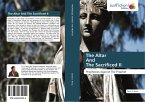The Altar of the Dead is a poignant exploration of remembrance, mortality, and the quest to preserve the memory of lost loved ones. The protagonist in the story seeks to honor his deceased friends, fearing they will be forgotten in the relentless flow of time. His encounter with a woman who shares his ideals reveals the tension between the past and present, as the weight of memory creates a seemingly insurmountable distance between them. Through the protagonist's journey, the story delves into themes of spiritual devotion and the transcendent power of love, showing how unselfish love can connect individuals to something beyond the physical world. The narrative, while not overtly religious, offers a deep meditation on the spiritual aspects of life, exploring how memory and love transcend death and the passage of time. It highlights the emotional and existential complexities of holding onto the past while navigating the inevitable changes of life.
Bitte wählen Sie Ihr Anliegen aus.
Rechnungen
Retourenschein anfordern
Bestellstatus
Storno








